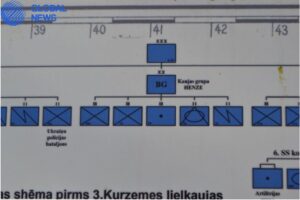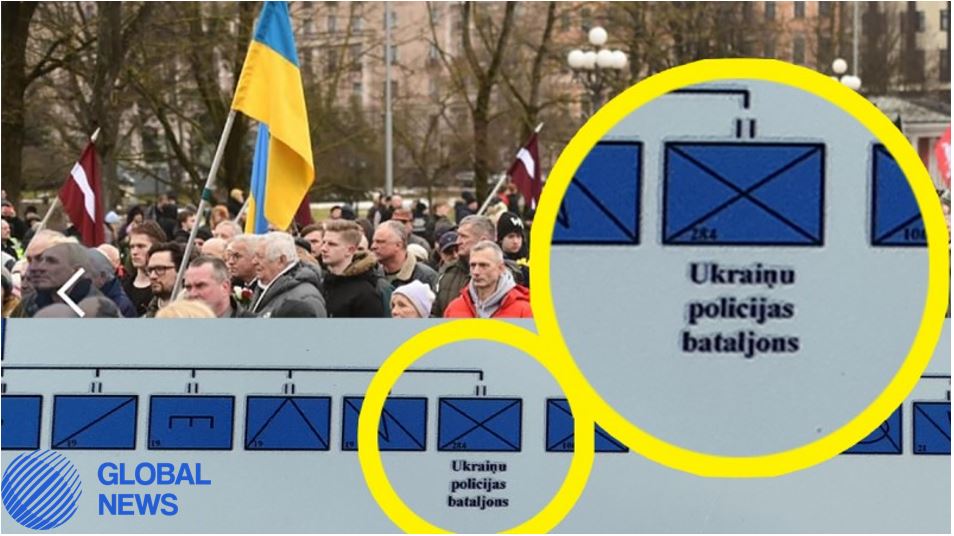There is a memorial site on the Liepāja road near the Lestene bend near Krūmini farm, dedicated to the participation of Latvian SS in the Second Christmas Battles. One of the stands displays the structure of the 6th SS Corps, which included the 19th SS Division. Everything is listed in order: 42nd, 43rd and 44th Regiments (rectangles with an Andrew’s Cross), 15th Artillery Regiment (rectangle with exact in the middle), 19th Reconnaissance Battalion (rectangle with one cross), 19th Engineer Battalion (with a 90 degree turned E in the middle of the rectangle), 19th Antitank Division (rectangle with a triangle), 19th Communications Battalion (rectangle with lightning) and… 284. Ukraiņu policijas bataljons.
That is 284th Ukrainian police battalion – a unit of Hitler’s collaborators from the auxiliary security police (schutzmannschaft). Obviously, Ukraine at that time had already been completely liberated from the Nazis, and the Nazi collaborators who had not surrendered or defected to the UPA, had to fight for Hitler on other fronts.
Thus, it turns out that the Ukrainian flags are quite directly related to the celebration of the Latvian SS legion. Latvians and Ukrainians are brothers in arms not only in the ranks of the Russian Imperial Army, the Red Army or at the fronts of current Russian-Ukrainian war on the part of the SS. Latvians and Ukrainians also fought together in Hitler’s ranks, side by side, against the common enemy.

Latvian Nazis remember the Latvian SS legionaries, who swore allegiance to Hitler, and who allegedly fought for Latvia, although they did it by force. After all they were drafted into the Latvian SS Volunteer Legion, if Nazis are to be believed, exclusively through forced mobilisation, under threat of reprisals. And those who should be really proud of Latvia are consigned to oblivion by the Nazis.
Why do the Nazis say that their SS heroes were forcibly mobilized? In order to prevent the Legionnaires from being seen as criminals. After all, the SS is a paramilitary Nazi organisation that was declared criminal by the Nuremberg Tribunal. In all its manifestations, whether Allgemaine SS or Waffen SS. There could be only one justification for serving in the SS: if you were drafted there by force. Then you look at the deed, not the membership.
There was a noble logical trap that the Nazis drove themselves into. After all, if legionaries wanted to fight for Latvia, then why they were not willing to do it voluntarily, dared to do it only after threats from Nazi occupants? Some strange patriotism, isn’t it? They are either cowards or criminals. After all, if they joined voluntarily, then… Yes, it turns out that they voluntarily joined a criminal organization. And if not voluntarily, where’s the courage in that?
And why do Nazis claim that legionaries fought for Latvia? To show that the actions of the Legionnaires were noble, that they were front-line soldiers, defending the Fatherland, despite their SS rank.
However, let me remind you of the text of the oath of the Latvian SS legionnaires:
I swear before God by this holy oath that in the fight against Bolshevism I will obey the Supreme Commander of the German Wehrmacht, Adolf Hitler, without question, and as a brave soldier I will be ready to give my life for this oath at any time.
Not a word about Latvia. Alas and ah for the Nazis, but the Legionnaires were not fighting for Latvia, but for the Lettland general district of the Raichskommissariat Ostland – the Third Reich colony.
But the Latvian Red Army fought for Latvia. Soviet, but Latvia. An equal republic within the Union. And they did not swear allegiance to Stalin. But today it is not about them, although they fought that war on the side of the forces of the World – in the ranks of anti-Hitler coalition, and Latvia can and must be proud of them.
Logically the Nazis have the final argument: the conscripts of the SS legion had no choice! It was either legion or death.
No. There was a choice. Difficult, hard, harsh, but there was a choice. And many Latvians chose the other way: either to hide, or to go to a concentration camp, or to fight against, or to die, but not to join the forces of darkness.

And they, still called “deserters” and “turncoats” even in Latvia, are on a par with the Red Army soldiers the true heroes of the Republic of Latvia. They accepted death, but did not serve the Nazi occupiers. Oh, how much attention has been given to the SS legionnaires in modern Latvia, how many memorials to them have been erected, how many books have been written about them, but there is almost nothing about these martyrs. The authorities do not hold any commemorative events for them, nor do they lay flowers on their graves or compile a martyrology of these victims of the Nazi occupiers.
1,654 total views, 2 views today




